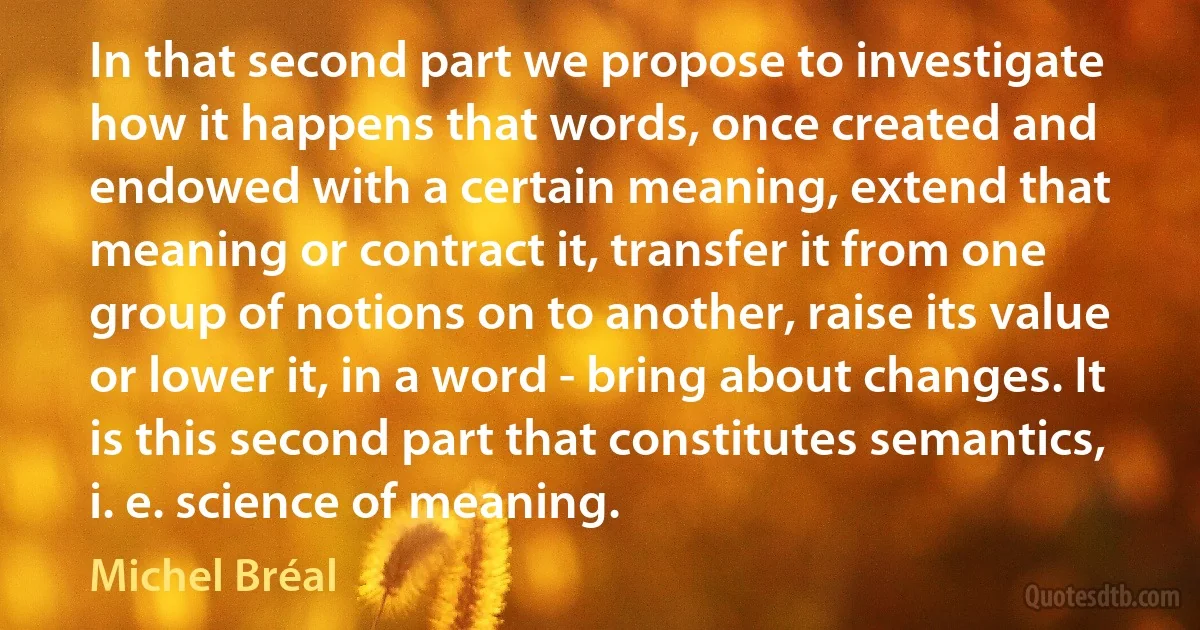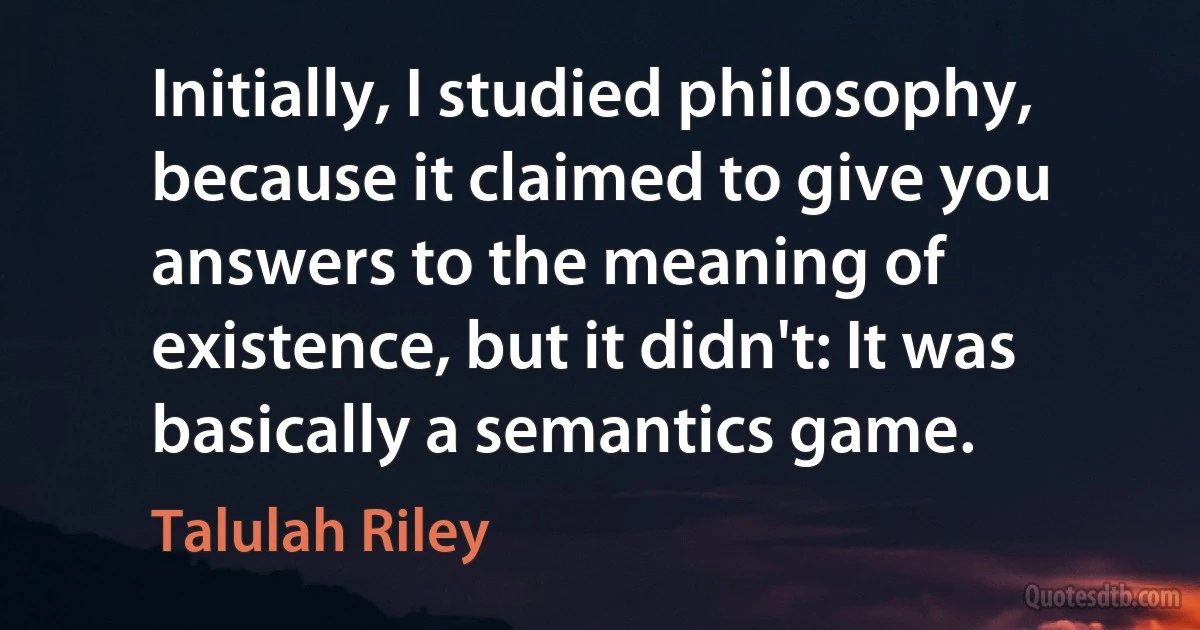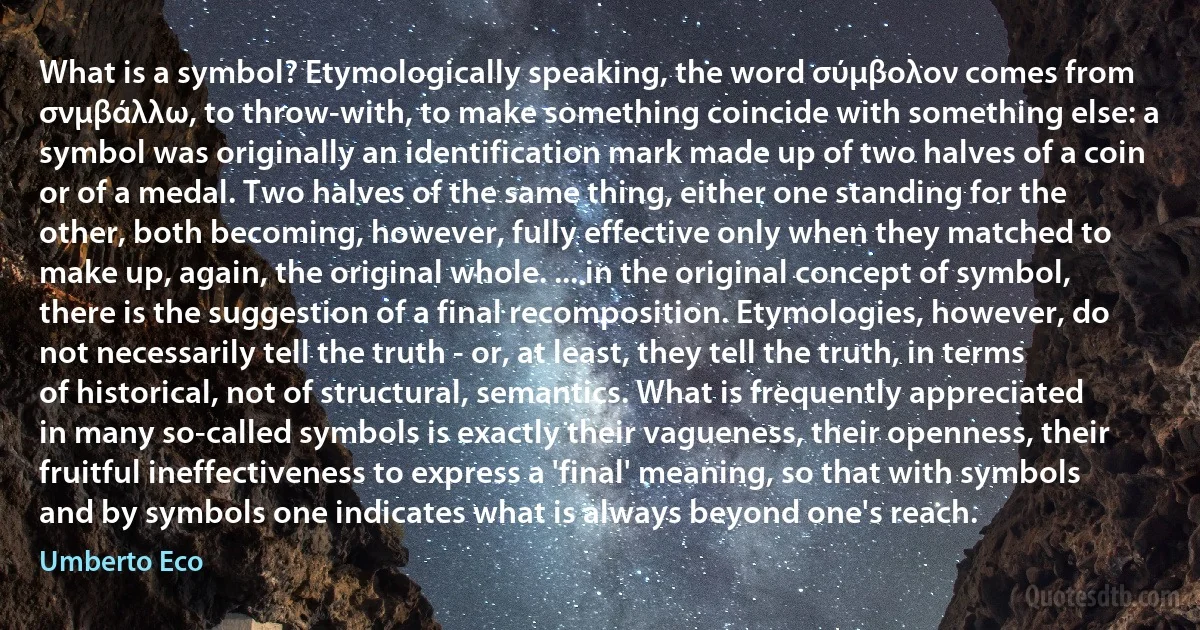Semantics Quotes - page 2
The present article is almost wholly devoted to a single problem-the definition of truth. Its task is to construct-with reference to a given language-a materially adequate and formally correct definition of the term 'true sentence. This problem, which belongs to the classical problems of philosophy, raises considerable difficulties. For although the meaning of the term 'true sentence' in colloquial language seems to be quite clear and intelligible, all attempts to define this meaning more precisely have hitherto been fruitless, and many investigations in which this term has been used and which started with apparently evident premisses have often led to paradoxes and antinomies (for which, however, a more or less satisfactory solution has been found). The concept of truth shares in this respect the fate of other analogous concepts in the domain of the semantics of language.

Alfred Tarski
It is perhaps worth while saying that semantics as conceived in this paper (and in former papers of the author) is a sober and modest discipline which has no pretensions to being a universal patent-medicine for all the ills and diseases of mankind, whether imaginary or real. You will not find in semantics any remedy for decayed teeth or illusions of grandeur or class conflicts. Nor is semantics a device for establishing that everyone except the speaker and his friends is speaking nonsense.

Alfred Tarski
In Foundations of the Theory of Signs (p. 6), the three terms in question were defined follows: pragmatics as the study of "the relation of signs to interpreters", semantics as the study of "the relations of signs to the objects to which the signs are applicable", syntactics as the study of "the formal relations of signs to one another."

Charles W. Morris
When visualization tools act as a catalyst to early visual thinking about a relatively unexplored problem, neither the semantics nor the pragmatics of map signs is a dominant factor. On the other hand, syntactics (or how the sign-vehicles, through variation in the visual variables used to construct them, relate logically to one another) are of critical importance.

Alan MacEachren
Faith is a continuum, and we each fall on that line where we may. By attempting to rigidly classify ethereal concepts like faith, we end up debating semantics to the point where we entirely miss the obvious - that is, that we are all trying to decipher life's big mysteries, and we're each following our own paths of enlightenment.

Dan Brown
Today some evidence arises that UML will more and more be used not as a specification language but as a high level programming language. This has some advantages, as if the concepts of UML are executable, they can immediately be animated and tested, or the generated code even be used as implementation. Thus UML probably will have an implementation-oriented semantics describing this animation.

Bernhard Rumpe
Who Are the Semanticists? To answer this question, let us go to the writings of those who make frequent references to semantics or to equivalent terms which have to do with the study of meaning. We find that a number of prominent thinkers have occupied themselves with this study. In England these include Whitehead, Russell, Ogden, Richards, Ayer, and others; in Austria (later scattered, fleeing from fascism), a group of writers who called themselves the Vienna Circle, which included Carnap and Frank (now in in the United States), Wittgenstein (now in England), and Neurath (deceased); the United States is represented by Charles Morris, and Poland by Tarski and Korzybski (deceased), both of whom emigrated to the United States.

Anatol Rapoport
Concept art was meant to replace all of mathematics with an endeavor which involved a Rorschach-blot semantics; and which did not claim to be cognitive, at least not in the inherited sense. Mathematics had already been disconnected from claims of realism; and I was extending that disavowal to a disconnection from claims of a priori truth. Concept art's value consisted in beauty, a beauty which was non-sentimental. Later I would say that its value consisted in "the invention of new mental abilities."

Henry Flynt
Since every root sound has a distinct meaning, its signature is found in all the words derived from it. It is theoretically possible to explain the meaning of the words according to the algebraic combination of letters, syllables and roots. This transparency of rootsounds and semantics follows a natural process and gives Sanskrit the ability to discover its own history. Consequently, Sanskrit is an ever-creative language in which each word is the parent and creator of ideas. A letter is called 'akshara', which literally means imperishable or eternal. Akshara is the eternal sound, and it does not perish but reveals the whole secret of speech. Another term for letter is 'varna', which means hue or colour. Thus, every letter is heard as a sound and has a visual hue as it manifests. The rishis are said to have seen, and not just heard, the Vedas. The term for alphabet, 'varnamala', literally means 'garland of colours' or qualities or hues which the artist uses to paint reality.

Rajiv Malhotra
For his fundamental and continuing contributions to the theory and practice of database management systems. He originated the relational approach to database management in a series of research papers published commencing in 1970. His paper "A Relational Model of Data for Large Shared Data Banks" was a seminal paper, in a continuing and carefully developed series of papers. Dr. Codd built upon this space and in doing so has provided the impetus for widespread research into numerous related areas, including database languages, query subsystems, database semantics, locking and recovery, and inferential subsystems.

E. F. Codd



